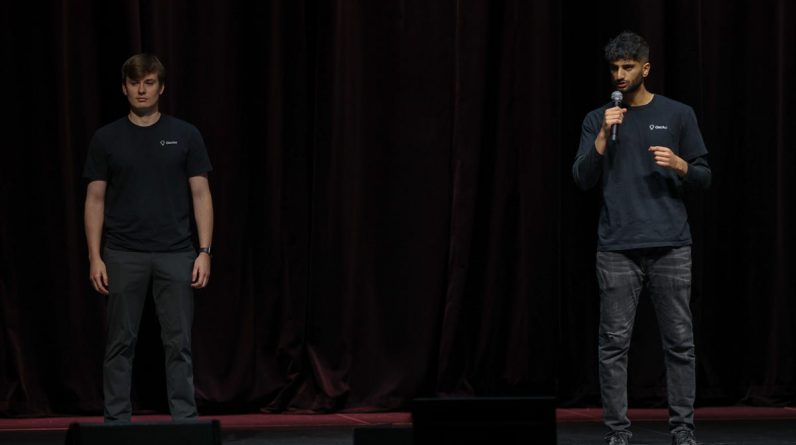
| Contributor
Hackers pose one of the greatest threats to modern society.
Preventing hacks and cybercrime may cost companies a lot in security personnel, but these costs are far greater if they experience a serious data breach. Cybersecurity expert Jeevan Jutla has been battling against sophisticated cybercrime since he was a teenager by thinking the way a hacker thinks, anticipating weaknesses before a security breach occurs, and leveraging the power of artificial intelligence.
Jutla’s career in cybersecurity began in an extraordinary way—he joined the UK Intelligence Service as a teenager. He went on to start Gecko Security, an AI cybersecurity solution designed to make software more secure while keeping in-house security teams lean and effective, alongside co-founder Artemiy Malyshau. Gecko leverages AI automation to perform complex security testing and quickly identify the kinds of vulnerabilities that would be exploited by cyber criminals.
Jeevan Jutla’s groundbreaking work in AI-driven cybersecurity and his vision for making vulnerability research faster and more scalable are testament to his hard work, dedication, and natural talent.
Today’s article will take a closer look.
Think Like a Hacker: Jutla’s Early Years in the Intelligence Service
In 2020, a teenage Jutla earned a top score on a highly competitive aptitude test, which earned him a job researching cybersecurity vulnerabilities with the government agency.
His work involved securing software using AI to find and close any loopholes where someone could exploit a vulnerability in the code. He employed strategies like fuzzing, where deploying non-standard inputs into a software program exposes ways that they don’t behave as expected. By repeatedly testing a software program, the resulting errors help cybersecurity experts stay ahead of hackers.
The software he evaluated for potential weaknesses and errors included code crucial to the security of government infrastructure, like power grids, where a hack could be very costly.
While pursuing his Bachelor of Engineering degree at King’s College London, Jutla joined Binance — the world’s largest cryptocurrency exchange — as a security engineer for their Red Team, a unit focused on offensive security that works to stop cybersecurity threats before hackers can compromise data.
His efforts to test and strengthen software code recovered hundreds of thousands of dollars stolen by hackers, tracked illicit funds to prevent money laundering from working effectively, and helped law enforcement reduce cybercrime.
Jutla’s detail-oriented coding and software testing work helped build his extensive knowledge of AI, which he used to automate tasks that would have once taken highly trained cybersecurity experts much longer to accomplish.
Jutla’s Winning Streak in Global Hackathons and AI Research
New code concepts are often born through competitions called hackathons, which showcase an engineer’s ability to find and fix code vulnerabilities.
Jutla’s career has been defined by his ability to push limits. He has won more than 15 prestigious hackathons since 2022, earning over $100,000 in prizes and a global rank in the top 500 for competitive hacking.
Jutla is passionate about designing problems for future hackathons and judges the results of hackathons as a way to give back to the community and help bring through upcoming talent in cybersecurity and software engineering.
Jutla met his future co-founder Artemiy Malyshau while studying in London and they began entering hackathons together. Throughout these high-pressure, high-energy events, he and Malyshau refined their growing vision that AI automation could do more for cybersecurity teams.
Software was already being used to find basic bugs, but AI’s potential for uncovering more complicated vulnerabilities was an exciting possibility, one that Jutla and Malyshau knew they could develop themselves.
With their vision growing clearer and clearer, they were accepted into the best-known start-up incubator in the world: Y Combinator. Y Combinator’s signature combination of strong vetting, deep cohort building, and mentorship leading to investment was the perfect place for Jutla and Malyshau to find themselves as they launched Gecko Security.
Bringing Innovation to Market: Launching Gecko Security
Gecko Security is not just another security tool—it represents a fundamental shift in cybersecurity, making vulnerability research both faster and more scalable by finding flaws in the software that traditional security testing software wouldn’t be able to detect.
Even though it evaluates the data for logic bugs and other complex vulnerabilities, it doesn’t come back with a huge list of flags that turn out to be nothing; Jutla and Malyshau pride themselves on Gecko’s false positive rate and intelligent threat prioritization system, which save teams time and help them focus on what matters most.
With a tool like Gecko, even smaller IT and cybersecurity teams can aspire to much stronger, more secure code. Despite being only a few months into founding the company, the team has already seen immediate applications of Gecko in securing software, demonstrating its potential to be a gamechanger for security teams.
Putting AI to Work for a More Secure Future
Cybersecurity is facing an unprecedented challenge—more vulnerable software is being deployed than ever before, even as the number of cybersecurity professionals continues to grow. According to Jeevan Jutla, the only way to close this gap is by moving from automating parts of security testing to automating the entire process itself.
This is the driving vision behind Gecko Security.
Jutla sees the future of cybersecurity as one where AI can identify and address vulnerabilities autonomously, dramatically improving security while freeing up human researchers to focus on even more complex challenges.
He believes that automating parts of security testing is only the beginning. In the future, sophisticated AI will identify and even address security vulnerabilities itself, and Jutla is already working on the next iteration of Gecko Security’s features to realize this vision.








